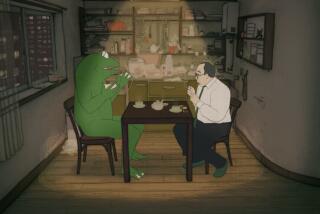A Nuclear Noah Builds His Ark : THE ARK SAKURA <i> by Kobo Abe; translated by Juliet Winters Carpenter (Alfred A. Knopf: $18.95; 352 pp.) </i>
- Share via
Many of the novels of Japanese author Kobo Abe have been concerned with the question of identity and survival. The main character of “The Woman in the Dunes” has to change his sense of identity in order to cope with living in a sand pit.
In Abe’s latest book. “The Ark Sakura,” an obese man who goes by the name of Pig or (preferably) Mole has constructed a kind of “ark” which is actually a nuclear shelter he has built out of an abandoned underground rock quarry. He is faced with the problem of whom to select as his crew, but circumstances eventually dictate the selection of crew members: a sakura , and an insect dealer, among others. ( Sakura means “shill,” in this case one who is hired by stores to buy merchandise in order to entice customers into buying.)
Mole’s ark is not as secure as he thought; he comes into conflict with the Broom Brigade, a neo-militarist group of senior citizens, which prefers to select survivors of a future nuclear war through fascistic means. Originally, Mole much preferred to be alone, sitting on a toilet in the rock quarry, and so, as others are drawn into his world and disrupt it, he is increasingly drawn to the world outside the quarry.
Much of Mole’s life, in fact, is centered around the toilet and the issue of survival and disposal. His father once chained him to the toilet as a punishment during his childhood. In addition, Mole made a business out of disposing of wastes--toxic chemicals and aborted fetuses--through the toilet and used the profits to furnish his ark with mechanical devices, booby traps and food supplies.
Abe’s depiction of the deadly game of survival is hilarious but at the same time leaves us with a chilling sense of apprehension about the brave new world that awaits us in the future. Juliet Winters Carpenter has ably rendered Abe’s earthy, Kafkaesque sense of humor into English; much to her credit, the dialogue is more colloquial than in many translations of Japanese novels, even though the book is sprinkled with a few curious expressions here and there.
More to Read
Sign up for our Book Club newsletter
Get the latest news, events and more from the Los Angeles Times Book Club, and help us get L.A. reading and talking.
You may occasionally receive promotional content from the Los Angeles Times.










